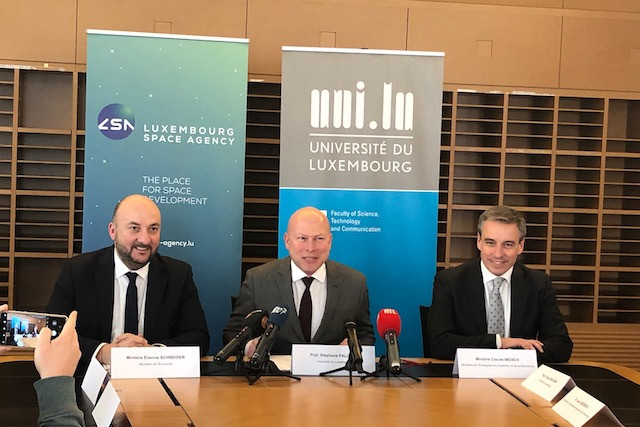Co-financed by the Luxembourg Space Agency (LSA), the programme is supported by the ministry of the economy, plus a number of industry partners. It kicks off in autumn 2019 and runs €2,000 per semester.
“This is a generalist programme for those with a solid basis of science but who don’t have skills in space,” University rector Stéphane Pallage said in a joint press conference on 15 February. The programme will provide both technical (space) and managerial know-how.
He added that to date, there have been some 40 research projects financed or co-financed by companies or institutions in the sector, such as the LSA, SES and Luxspace.
Vice-rector Tonie van Dam added that the programme is “elite”. “We have a reputation to build, and we need local industry to trust us,” she added, when asked about the costs.
Two laboratories are also being developed in conjunction with the programme, one in robotics, the other still under discussion, although it will likely be a facility related to “missions, payloads, propulsion systems,” said van Dam.
High impact on the Luxembourg economy
During Friday’s press conference, minister of the economy Etienne Schneider highlighted the fact that the space sector not only accounts for around 2% of Luxembourg’s GDP, but that it has an increasingly important role in the economy.
In a recent study conducted by the LSA, up to €170 billion linked to the utilisation of space resources could be generated through 2045. And spillover effects are expected to be even higher, up to €2.5 billion over 50 years.
In 2017, Luxembourg adopted a law on space resource exploration--the second legal framework worldwide after the US. But, as Schneider noted, investment and commercialisation might be one thing yet, “Education is important…we need to build that up here, not keep looking externally.”
Minister of higher education and research Claude Meisch agrees with Schneider, saying he sees two goals to the programme, the first being that it helps establish an “international level of excellence”, the second as part of the “national strategy to continue developing the Luxembourg economy”.
Applying for the programme
Applications for the programme are already well underway and spaces are available for a total of 20 students.
To apply, individuals will be required to be fluent in English, submit a motivation letter and other required documentation, and be in the top 20% of their graduating classes. For more information or to apply, visit ism.uni.lu.
